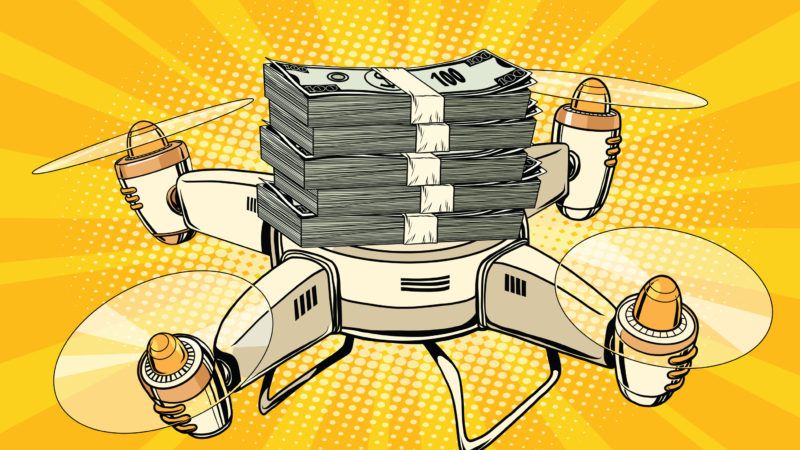Congress and the White House Are Inching Closer to a 'Helicopter Money' Response to Coronavirus Crisis
In the past, the federal government has sent everyone checks to stimulate the economy. But paying for all the losses that come with a coronavirus-induced shutdown would require more novel policies.

Cutting every single American a check was once the zany idea of a long-shot Democratic presidential candidate (Hi, Andrew Yang!). It's now the consensus policy response to an imminent coronavirus-induced recession.
"We're looking at sending checks to people immediately," said Treasury Secretary Steve Mnuchin at a press briefing. "Many companies have shut down, whether it's bars or restaurants. Americans need cash now, and I mean now in the next two weeks."
On Monday, Sen. Mitt Romney (R–Utah) endorsed a minimum one-time transfer of $1,000 to all Americans as part of a broader set of economic relief proposals.
Democrats are warming to the idea as well. Rep. Tulsi Gabbard (D–Hawaii) has introduced a resolution for an emergency universal basic income to last until the current crisis is over. Harvard professor and former Obama administration economic advisor Jason Furman has reportedly been trying to get House Democrats behind a check-cutting policy.
These proposals are not entirely unprecedented.
To combat the dot-com bubble bursting, Congress passed stimulus legislation in June 2001 that saw some 90 million taxpayers get rebate checks of between $300 and $600.
Then in early 2008, Congress passed the Economic Stimulus Act in an attempt to stave off the Great Recession. That legislation included provisions for mailing 130 million taxpayers a basic tax rebate of either $600 for single-filers or $1,200 for married couples. Parents could claim an additional $300 for each dependent child.
There are some significant differences between these rebates and what is being proposed now, however, says David Beckworth, an economist at George Mason University's Mercatus Center.
"They were just one-time shots. They weren't like what was being proposed now, which is a little more continuous, or at least [continued] for the duration of the crisis," says Beckworth. That means the current policies being considered would be much, much more expensive.
The 2001 rebates cost $38 billion. The rebates given in 2008 cost $113 billion. Sending every adult American a $1,000 check, as is being proposed now would cost $2.8 trillion a year according to the Tax Foundation, or about $230 billion a month.
Paying for something like that, says Beckworth, will likely require intervention from the Federal Reserve. The Treasury, he says, could sell bonds to the Fed for cash, and then give that money to the Internal Revenue Service to mail out as checks to taxpayers.
This would essentially be the "helicopter money" approach Milton Friedman first proposed as a thought experiment in the late 1960s.
Beckworth says the idea has a couple of things going for it during this current crisis. With huge swaths of the economy essentially shutting down in an effort to stop the spread of coronavirus, dropping money from metaphorical helicopters (or maybe drones) would be the best way to ensure that everyone who suddenly finds themselves out of work will get some relief.
"It would bypass the normal plumbing of monetary policy. I think that's the biggest argument for it," says Beckworth.
The Cato Institute's Michael Tanner criticized this approach to me yesterday, suggesting that most people either aren't missing paychecks because of the current crisis or are already eligible for existing relief programs. Sending checks to everyone will then shower benefits mostly on people who don't really need it, Tanner argued.
"This is a knowledge problem," counters Beckworth, saying that government officials are not going to be able to come up with precise eligibility requirements that funnel aid to the people who need it while avoiding sending it to people who don't.
Even if bureaucrats could come up with the appropriate eligibility criteria, there's a question of whether the government would be able to effectively administer a program like that in a pinch.
There are still huge risks of an emergency universal income financed by the Fed, acknowledges Beckworth.
"If you start doing that, then you open a Pandora's box for politicians and others who are going to want to do it all the time," he says, adding an ideal policy "needs to be very much based on a rule or condition. You don't want to send them out willy-nilly. You want to tie it to an economic indicator." Such a rule, he says, would force politicians to "turn off the spigot" when the crisis has passed.
He suggests tying such a policy to a monthly measurement of household income or even a rate of nominal GDP growth, with the government continuing to spend until that target is reached.
Even if a helicopter money policy was bound by such a rule, however, there'd always be the danger that politicians and central bankers could ignore it. Paying for economic relief by creating money also raises the specter of inflation.
Beckworth urges free marketers to "think strategically, not tactically." If universal economic assistance, financed by the Fed and bound by some sort of nominal GDP or other target, is successful in staving off a serious economic crash, that would reduce the demand for more extensive regulatory interventions that could have a longer, more damaging effect, he argues.
"Take a pragmatic approach here," says Beckworth. We should be willing to "fight the good fight to minimize any further growth of permanent government programs that are going to happen if we don't get ahead of this."
Rent Free is a weekly newsletter from Christian Britschgi on urbanism and the fight for less regulation, more housing, more property rights, and more freedom in America's cities.


Show Comments (53)